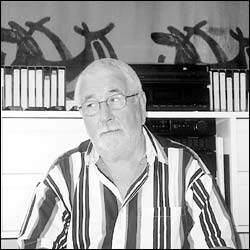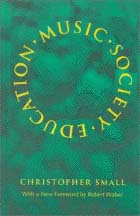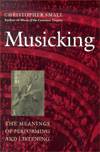Note 2018: I reread this 14 years old article and found out that it’s written in a style that I hope not to have still – actually the manifestoish exclamations should at least have been spared to a separate text and instead I should have made a bit more effort to present Christopher Small to swedish readers on his own terms, without drifting off to my own will to challenge the swedish “contemporary music” society in a number of ways. Well, its’ done. Maybe actually the second note has a bit more explanatory power because I had to correct the misunderstandings that was the only printed reaction to it at all.
Christopher Small and the future of the musical ritual.
|
Music is not just music. Such a reduction will answer no question about what makes music engaging or necessary. Christopher Small, the musician and writer from new zeeland, uses instead the concept of “musicking” and “to music”, which involves all of the musical situation and its human activity. If we use Small's way of seeing music as a number of linked human activities, an alternative to the commercialism and individualism of our time which persists over music life, is offered. Christopher Small describes musical life in his books like no other. Music is not objects but activities involving musicians, listeners, dancers or “just” present people. From the objects that are produced (sheet music, recordings) music can not appear in itself without a human activity having taken place. This activity takes place through the staging and thus to different degrees the confirming, exploring and celebrating of a long series of relationships. The relationships concern those between the musicians, between musicians and audience and possibly conductors, dancers, ticket prices, architecture, and the rest of society as well, nature and the conceptions of different supernatural worlds. |
 |
This is not an ideological idealization. But still, it is appalling, and of course understandable, that all music cultures look upon themselves from the perspective of their own prejudices. A museological, archival and hierarchical musical culture of “masterpieces”, “masters”, professional musicians, critics and musicologists with “perfection” as a rule of thumb, has of course less inclination to appreciate changeability in their interpretations, news, unpredictability and ambiguity or other disturbing elements or points of view, than a culture where all participate on equal terms and all are supposed to have a musical mind and the possibility to invent valuable contributions to the common, and in its details not strictly fixed, musical ritual. It's inevitable that analysis and attitude go together. Moreover, there's nothing wrong with that but a strength.
Much of Small's critique, which is mostly found in Musicking: The Meanings of Performing and Listening, concerns the function of the classical “musicking” of today, which is significantly different from that of the time the notes were written. Some examples: the extinction of improvisation, the appearance of concert houses with tickets for payment, the silencing of the audience, the deprival of its influence of what is played, the use of uniforms for the musicians, the professionalization of musicians and composers, the physical separation of the musicians from the audience and all the formalistic rituals with the entrance of the different groups into the hall and their gestures or absence of gestures towards each other, a repertoire that gives priority to already played, well known, old and dead composers whose works are nowadays seen as infallible and unchangeable.
Some of these developments can be seen as positive from certain limited aspects but is that enough? It's time to openly critizise the contemporary-classical musical culture's ideological and social core and overthrow it from its refugium of untouchability and superiority that it has today. In its present form, it's for the middle and upper class – countless surveys have confirmed that again and again, and the ritual that the concerts are, mirrors the ideals and self-image of those classes.
A musical situation (ritual) or the “musicking” can thus be seen as a mirroring, or a virtual realization of the hopes, prejudices and expectations of the participants, or if you prefer to say so, their ideology or utopia. Which preconceptions are behind classical musical culture as it looks today? I'm not going into the details of the evidence, but Small shows that it is the bourgeois “liberal” view of work or “corporate culture” as one says today and that is mirrored in the way a symphony orchestra (the extreme case) is run and how its activity is presented and carried through. The melodic and functional harmonic sound structure of the music reflects, and extra evidently in orchestra music, in its turn, the conceptions of the violent struggle towards victory for the individual hero (often the composer himself in mythological form), supported by a large number of less important additional figures. All this is carried through in an extremely formalistic and archival way, to underline that it's about ancient mythical times, a parallel to the real appearance of capitalism and the victory of the bourgeoisie, where the fights were fought and where the victories were won (nowadays called “democracy and free enterprise”) upon which the ruling classes build their empires and their illusions of their eternal and unconditional grandeur. Very carefully, everything that can shake this order or illusion of order is repressed.
It might seem paradoxical that this music culture, reflecting the ideals of liberalism, is largely dependent on public support. But the state incorporates the ideals of classical music culture with their general project of repressive tolerance and makes it into a conservative propaganda machine where they put it at the top level, while the others are supported to an “appropriate” degree.
When this becomes apparent I think we should go further and critically analyze our own place and effort in musical culture. In what ways do we participate in this formalistic and conservative, shortly: repressing myth and how can we break it? (I leave Small now, without necessarily leaving his opinions, and speak in my own name.
We must criticize, challenge and maybe leave everything in our small world of music: musicality, professionalism, virtuosity, instruments, sound forms, the concert form, individualism, money handling, ownership, subsidies. A moral condition is that we are aiming at working as free creative individuals with the purpose of inspiring poetic thinking, liberating movements and radical actions that can break down the repressive forms in and around us.
Musicality: almost noone is “tone deaf”, all children are born with a musical mind and their ability to express has as much value as long as they are encouraged to discover and develop it instead of being held down, which the school system is so good at on all levels.
Professionalism: noone has more or better things to say just because they earn money on what they say. Grading, competitions, star status, the hunt for money and fame, all this kills inspiration and hinders active participation in an official music life which is the condition for a vivid and valuable music culture. The musician becomes a businessman on the free market. But you can see professionalism in “cultural workers” (what is the view behind that awful word?) as a defense position as well – in order to avoid the alienating wage slavery instead of adapting to it. But when does even a professional musician become an alienated wage slave? “Tactics” seems often to have led to defeat.
Virtuosity: practice makes skill, and I'm an enthusiastic lover of acrobatics, but the passionless reproduction of show-off pieces on demand is a limited pleasure that can make more harm than good use. Every musician must be ready to take responsibility with his whole organism for what she is doing in every moment, not only with fame, habit, fingers and contracts!
Instruments: a violin and a rubber band must be equal on the level of audio poetry. It's the circumstance they exist in that decides their value as means of communication! A violin has of course great possibilities, but on the other hand more intimidating ability on amateurs because it's more expensive and because there are so many that can tell you how to make mistakes on it. So it promotes the conservation of professionalism.
The sound forms: reflect the forms and movements of thought and the body, collectively as well, however sometimes only potentially. The degree of moral and poetic courage and boldness in these correspond to the musical sounds you make, in addition to the way in which you make them. The musical revolution takes place at the same time as the moral and poetic ones. If you revolt against the forms of society and life, you make music in revolt. Your personal and relational aspects can be read in this way even if you don't try to be programmatic. If you welcome chaos, a topsy-turvy world, unpredictability, beauty from the most simple things, close social relations, generosity or problem-solving, it can be heard and seen. If you strive for control, prestige, dominance, monolitism, fame or money, it can be seen and heard. You just have to choose. Those who need an aesthetic recipe should look into the mirror – and see not only yourself but also your background and environment. Who are you, how do you relate to your tradition and your environment?
Concert forms: just a few questions (and answer them yourself!): is a concert house or a club (e.g.) the best place to exchange messages on? Which one has the greatest prestige? Where do you come closest to the listeners? Where do you have the greatest potential for a common experience? Is it better that people look in the same direction and noone sees, or notices, anything else than the musicians or the loudspeakers that work? Is there something else than the sounds and the sound makers that communicate – and what do they say? Is the rest of the environment participating in an exchange where the presence of the listeners is appreciated, or is it static, functional, bombastic, badly thought through, repelling or inspiring? Do the musicians care about the presence of the audience and in what way? Can you socialize and in what way? Is it allowed to eat, drink, dance and talk – with the musicians too?
Individualism: cultural life has never been as obsessed with personality as now. Stars are shining, the mass “doesn't exist”. Among few exceptions are certain aspects of club culture where people readily share and create anonymously. The preference for personal profit creates greediness, intrigues and secrecy. Is it worth it, or do you “sell your soul” when you think you buy yourself “eternal life”? The obsession about personality is closely related with the media cult, the religion of our times together with money and personality. The more media that appear today, the more monopolized the media and the bigger the power of the market. To attack and jump off the addiction to this circus demands the greatest courage but is one of the most important actions we must do. Most things of importance take place outside of the media-, money- and personality cults. We must also throw away all greediness and cooperate in networks constructed by ourselves, and be ready to drop demands for originality, urge for novelty and monopolies of ideas. Music is one of the activities most apt for collective creativity and has lots of possibilities of losing control, which opens for unpredicted possibilities for fantastic surprises. Improvisation can exist in millions of forms. The shit that is inevitably made on the way is not an argument against the pearls that can only form in this way.
Handling of money: after having struggled with the professional attitude myself, that we should be paid on equal terms and according to standards, it struck me that this attitude has nothing to do with poetic passion, and thus nothing to do with anything essentially human. Lets say it loud once and for all: money and musical quality have nothing to do with each other! Whatever you take or get paid for a job is a matter of survival. It's also a matter of prestige. With our demands for pay we also send the message that we sell a product, which belongs to the ideology that music is goods on the market and that we are merchants ourselves. An extensively expensive entrance ticket says that we are more worth than the visitors we share “the musicking” with. To deny an idealistic organizer a concert just because you can't get enough money can mean that you don't regard their enthusiasm and engagement as as valuable as your own, which increases the distance in communication and conserves the hierarchy that you then strive for. Many of my own most valuable concert experiences as a musician have been my least profitable, and everyone should at any time in their carreer at least give some concert for free or with free entrance.
Ownership: maybe the hottest potato. For survival reasons, many of us look carefully through the performance rights royalties reports and file complaints as much as we can. But we should at least pose ourselves the question if it's more important to own than to give away. To whom, of course. When “musicking”, the musicians give their work to the audience, who also give something back, according to the forms of the ritual. The importance in the work or the gift is not so much the quantity as the nature of it. Is the work or gift passionate, honest and non-alienated or is it a factory-like, preproduced standard product? According to the nature of “musicking”, music appears as it takes place between people, it exists only in the structure of the relational patterns and can't be owned in that sense. Even if almost the same sound might be used another time, musicking is different. So we must be aware that ownership only concerns a certain use of certain physical products that in one form or another can reflect certain sound structures that we have invented. This is something else than dealing with music – in the worst case pure greed! The music maker Godfried-Willem Raes has, in a similar argument, showed that it would be a good idea for almost everyone except for the music industry and its megastars that a possible payment for composing would take place only once. (1)
Subsidies: I'm not saying we should stop applying for support and scholarships – I just say we should be aware that we then participate in the culture of repressive tolerance. Our arguments for existing and working with “their” money will always come from an underdog position and we are exposed to the discretion of their more or less explicit conditions. Music is never meaningless. It can be vital, but for this, there is no need for either money, musicians, instruments, musicologists or composers! There is only the need for passionate, inspired and poetically inclined people.
Johannes Bergmark
[JB is a surrealist, music- and musical instrument maker, mainly active at Fylkingen, EMS and in the Surrealist Group in Stockholm.]
 Books by Christopher Small:
Books by Christopher Small:
Music – Society – Education, (University Press of New England, 1977)
 Music of the Common Tongue: Survival and Celebration in Afro-American Music, (Calder, London, 1987)
Music of the Common Tongue: Survival and Celebration in Afro-American Music, (Calder, London, 1987)
 Musicking: The Meanings of Performing and Listening (Univ. Press of New England, 1998)
Musicking: The Meanings of Performing and Listening (Univ. Press of New England, 1998)
Musicking, Chapter 1: A Place for Hearing
Links:
Christopher Small obituary, Musicologist and writer with radical views on education
A man to honor, by Greg Sandow
Christopher Small, Cultural Musicologist, Is Dead at 84, by Ben Ratliff
Perfect Sound Forever online music magazine presents... Christopher Small, Interview by Robert Christgau (October 2000)
Musicking: A Ritual in Social Space. A Lecture at the University of Melbourne June 6, 1995
Please also read: Danae Stefanou, Making the leap: Christopher Small’s visionary musicology. Approaches: Music Therapy & Special Music Education, 3 (2).
(1) The Absurdity of Copyright, Godfried-Willem Raes.
This article provoked a reply from Thomas Millroth. I replied with the following article: Music Is Nothing.